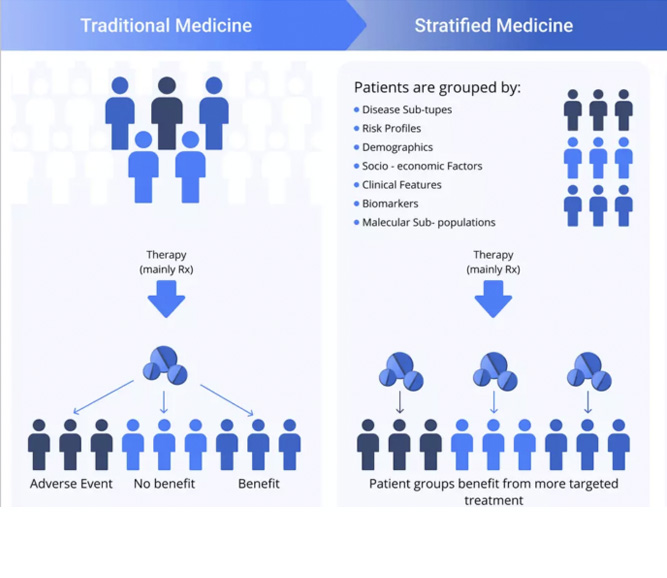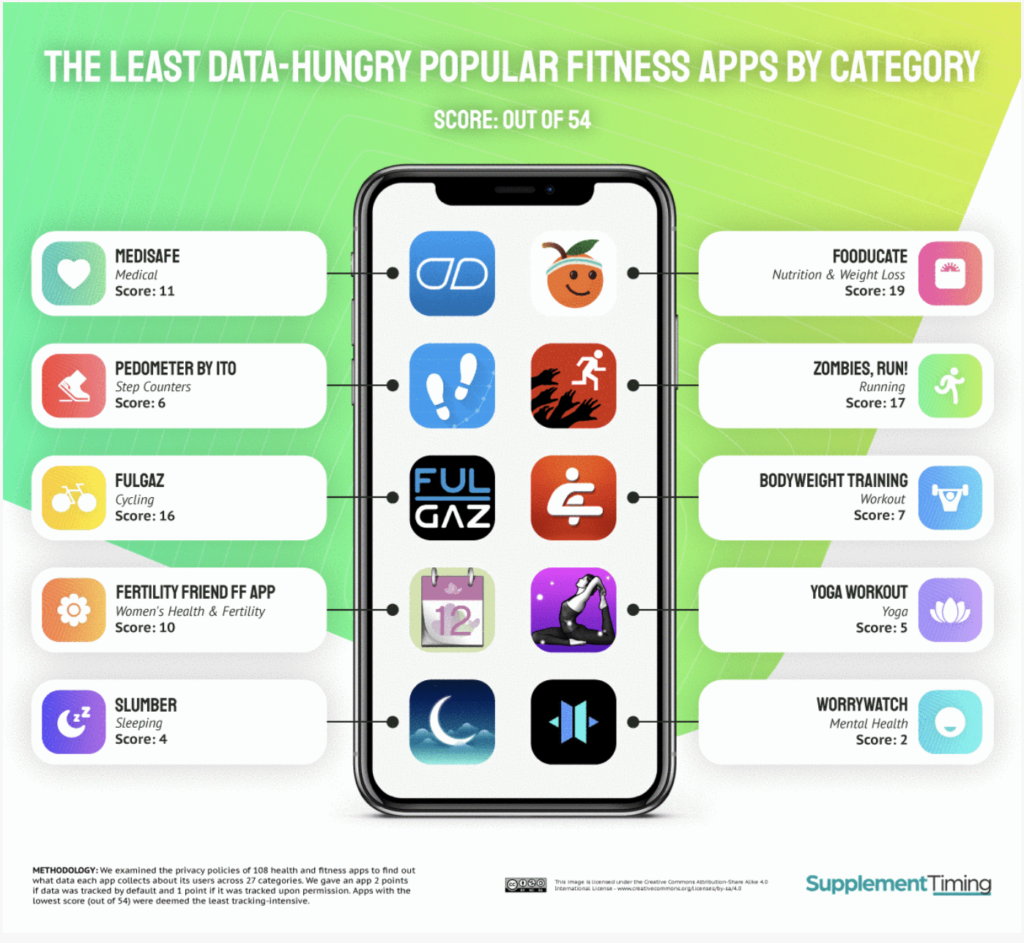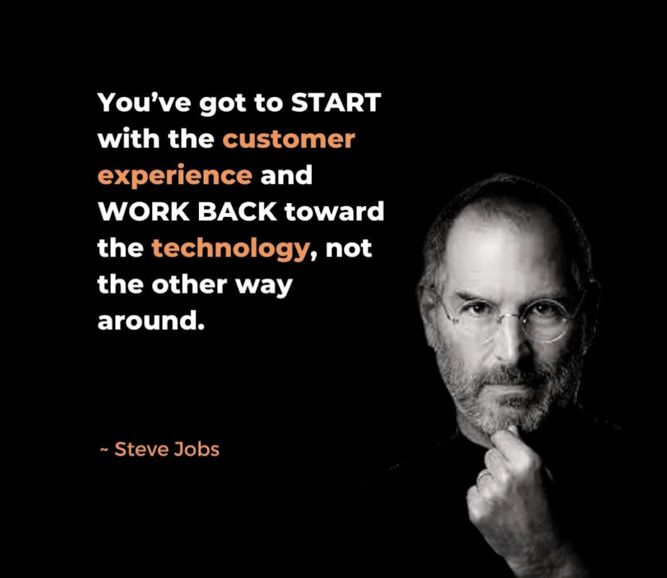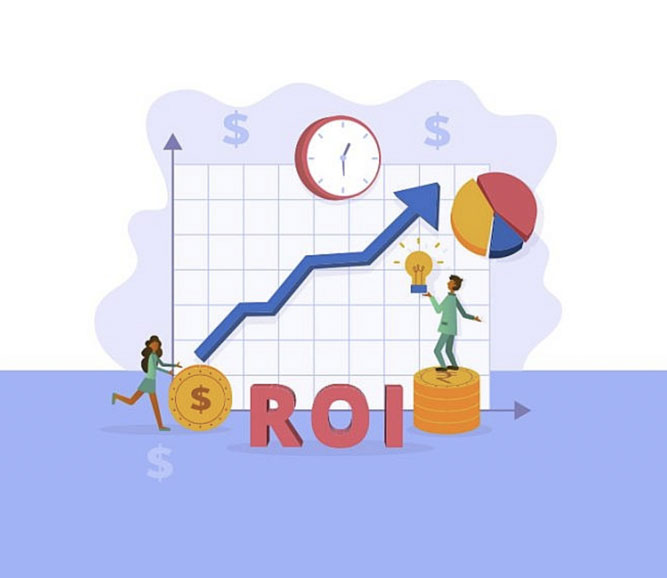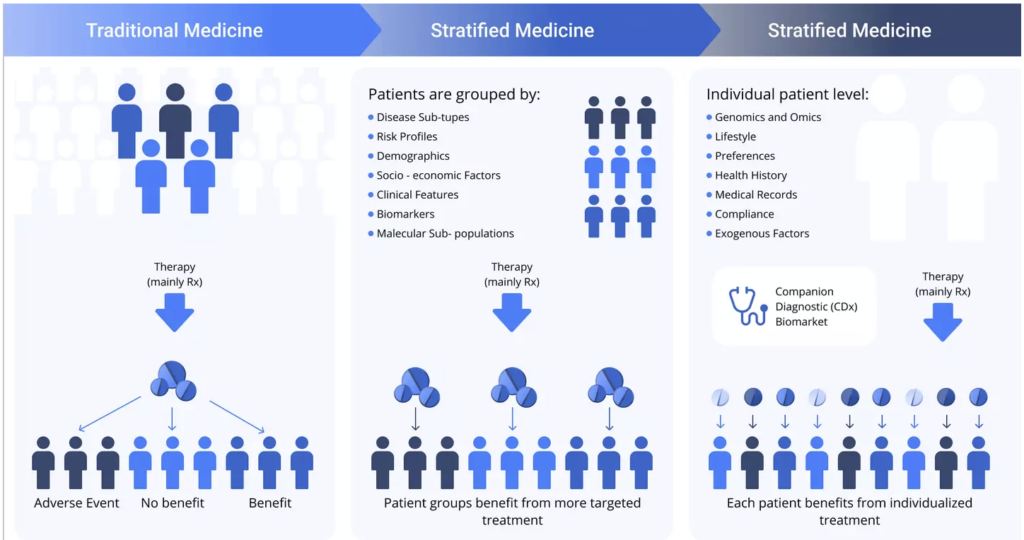
Joginder Vats had made peace with his 115 kg weight. He loved food and thought youth was about eating and making merry. Until one day his doctor told him that he was borderline diabetic. The choice was to change his lifestyle or take medicines for the rest of his life. Medicine makers had support programs, but he could only enroll in a program offered by a company that made the pill he bought. Customizing wasn’t an option.
After a few days of restless research, Joginder found solace not in the pills of the pharma industry, but in the technology of the future.
He downloaded an app that kept a count of the calories he consumed, counted the steps he walked or ran, and helped him to keep track of his workouts. A smartwatch on his wrist kept a track of his sleep, the water he consumed, the calories he burned, the distance he ran, the food he ate, and everything else he did during the day. It did that every day and every night. Initially, it was very tough to change his habits. But the app gave him a dedicated coach who coaxed him to do the right things. Eventually, the hard work paid off. A year later Joginder’s doctor told him he no longer needed medicines. He had reversed his diabetes without them.
Joginder worked in one of the largest pharmaceutical companies in the world. This experience was mind-bending for him. He always thought that innovative, breakthrough medicines were the best way to keep killer diseases like diabetes under check. Now, technology companies had all but broken that model. He realized that the sick wanted so much beyond a pill – a counselor, a coach, easy diagnostic tests, information, a community of people like themselves, access to insurance – and all of that was now available in the comfort of their homes, at a click of a button on their phones! “I didn’t even need to see a doctor for a year. All I did was talk to my coach,” says Joginder.
The pill is now a commodity that many of these companies provide at heavy discounts, making money off everything ‘beyond the pill’. Investors are betting heavily on the potential of technological innovation to transform the way healthcare is delivered. The Economic Times reported that in 2021, India recorded investments of $77 billion across 1,266 deals including 164 large deals worth $58 billion. While the money was reduced in 2022, the reason wasn’t a lack of faith in this business model.

Meanwhile, the pharmaceuticals industry most affected by this quiet but rapid change is grappling with its entrenched culture. Its current business is so profitable that everything else pales in comparison. ‘Build, measure, learn, build again’ – a mantra of the health tech industry is alien to pharma that doesn’t learn, build or measure after launching a product. Pharma also thinks of its customers as doctors alone and does precious little to connect with patients or caregivers. People who are not sick do not feature on their radar at all. These are cultural values that keep pharma focused on the pill and discourage thinking beyond it.
A social media poll conducted by MedicinMan showed almost predictable responses. 100+ respondents who work in the pharma industry in India were quite clearly divided. 48% of them wanted to know what beyond the pill actually meant, while 23% wanted to know how to execute it. The rest felt that the ultra-competitive environment in the Indian generics market required very high share-of-voice tactics (19%), or that their customers demanded product information (9%).
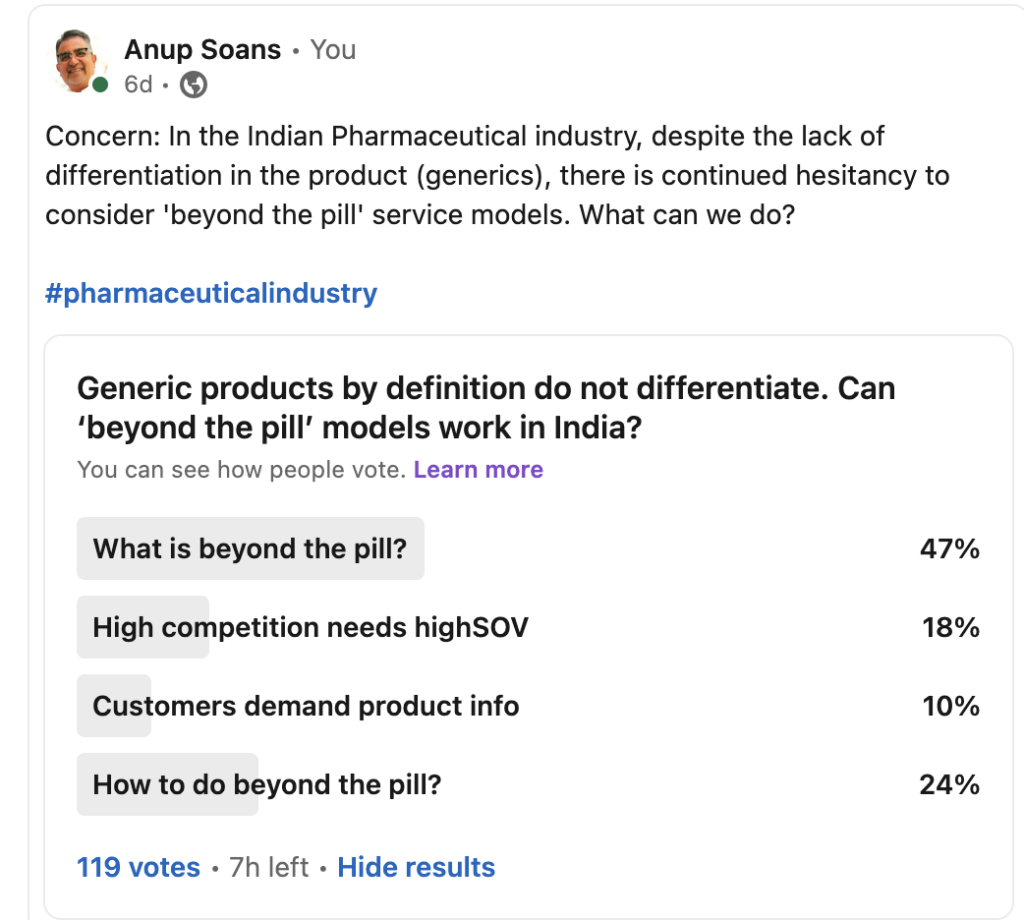
Commenting on the poll, Shantaprasad Nagarmath – Commercial Director of Consumer Health at Abbott India Ltd said “The poll rightly reflects the Industry sentiment on the need to demystify “Pill plus service”. Changing the healthcare landscape is democratizing health decisions for sufferers with information access, the emergence of health services, and a surge in alternative medicine. Pill plus service is a critical choice for pharma players to be made. Pill plus service looks at three early diagnoses, holistic treatment beyond pills, and engaging programs & pill reminders to drive compliance. To succeed, organizations must make choices on the right to win, build the right capabilities and partnerships to offer an integrated experience through HCPs.”
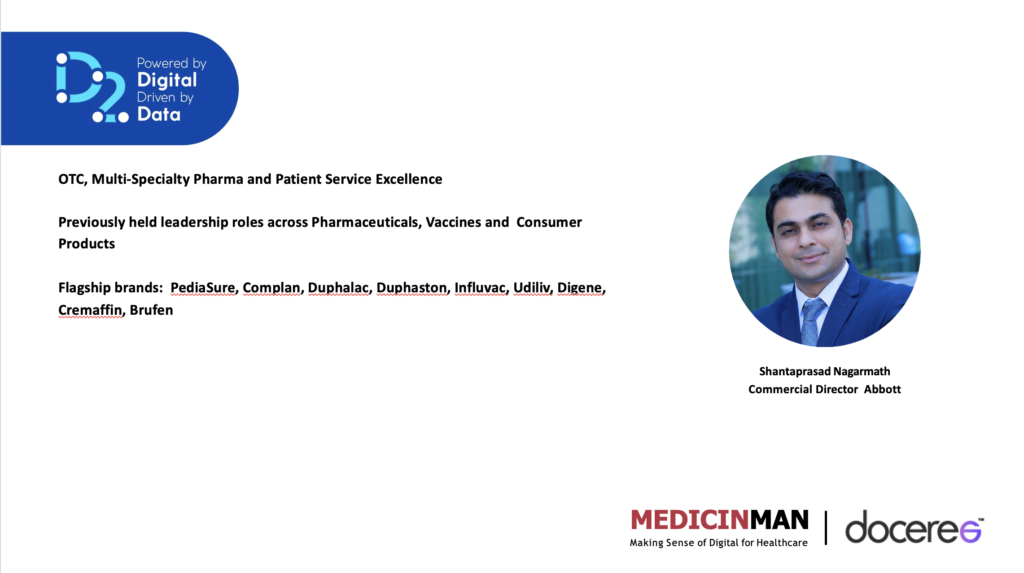
So what should pharma do? This is an industry that has an immense knowledge base. Its understanding of disease states, symptoms, treating patients and the functioning of healthcare systems is unparalleled. Digital health companies desperately seek this expertise.
The need to develop strong ‘beyond the pill’ capabilities is becoming ever more important for pharma as policy-led pricing pressures coupled with weakening public trust demand a different customer relationship management strategy. With the power of the physician declining on the brand choices the consumer makes, pharma must capitalize on the power vacuum or watch helplessly as customer relationships shift to newly emerging tech companies.
MVSMA Raja – Vice President of Marketing and Portfolio for Emerging Markets at Dr. Reddy’s feels “Post-Covid19 era, personalized wellness, and healthcare has become a big theme where consumers are focusing on health outcomes rather than on treatment with a simple pill. It becomes imperative for pharma to focus on patient journeys to understand the unmet needs and to provide solutions to manage overall health. This may include beyond-the-pill initiatives such as services, digital wearables, use of data and analytics to predict outcomes. Adopting to the new business model offers a unique opportunity for pharma companies to improve efficiency and build better relationships across the funnel, not just with doctors but with patients, caretakers, and pharmacies.”
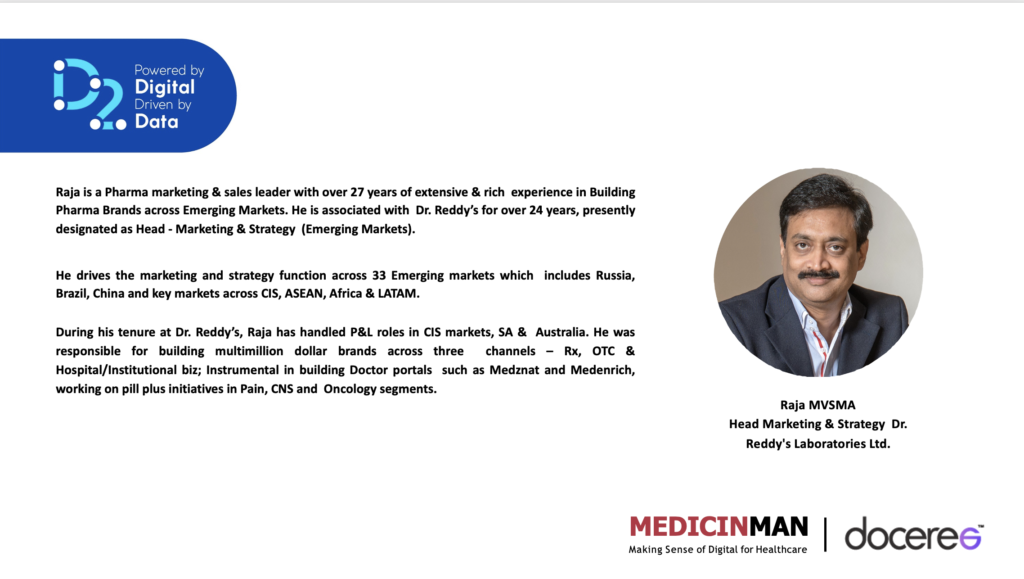
Since rebuilding public trust is a priority for pharma, an effective way to do so is by giving consumers proof of concept. Currently, a lack of accountability in the healthcare system creates problems for patients or caregivers to understand the cause of side effects, a lack of information to deal with emergencies, and precious little knowledge on how to prevent illness or morbidity. Apps, websites, online communities, simple in-app diagnostics, trackers, sensors, and many other simple-to-use tools have greatly solved this by empowering healthcare consumers to participate actively in their treatment regimens. Shouldn’t pharma take a leaf out of this book? “Ultimately everything boils down to understanding our stakeholders and delivering value to them. Digital is one of the means” says Raja Reddy, Director of Business Excellence at Servier.
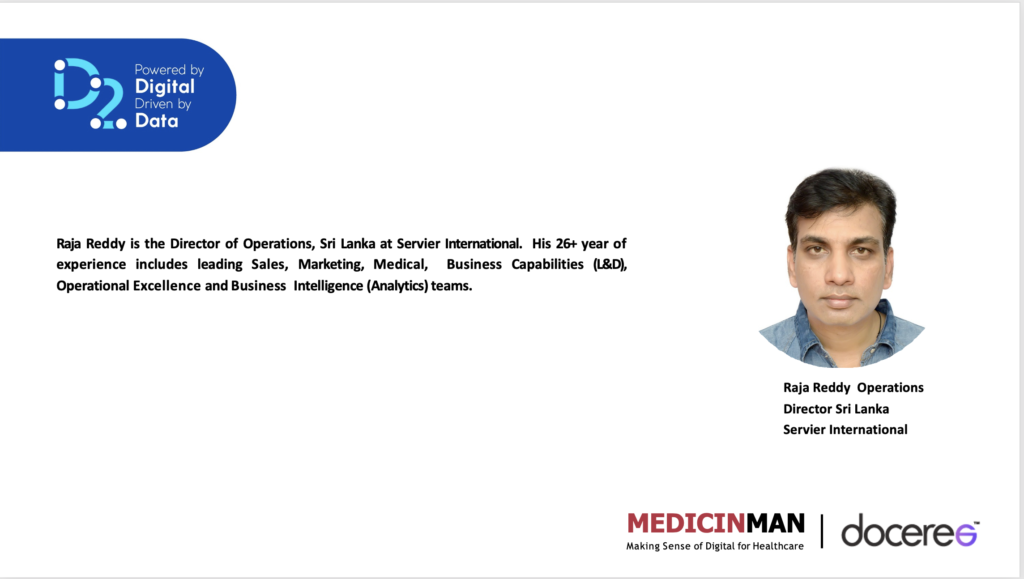
Very early in his journey, Joginder realized what he loved about digital healthcare. It made him feel in control of his health, nudged him along the right path, celebrated small wins, incentivized achievements and most of all kept him from straying. All this in the comfort of his home and privacy, while providing a human touch through a coach. He could be anywhere in the world, use any device, and continue his journey. The service didn’t limit itself to which brand of medicine he took, which phone he bought, or which cloud service he paid for. The app and the ecosystem worked seamlessly for him.
The personalization of care, the continuity of the therapy, the preservation of his independence, and the human touch were impressive. To him, this was true customer focus and it didn’t depend on a pill.


